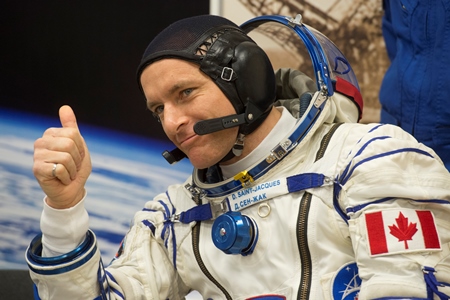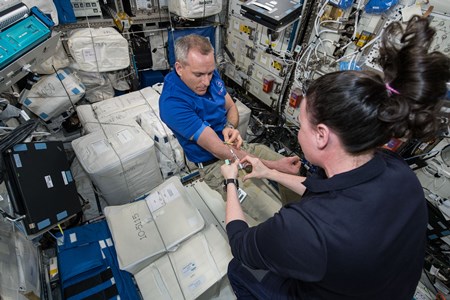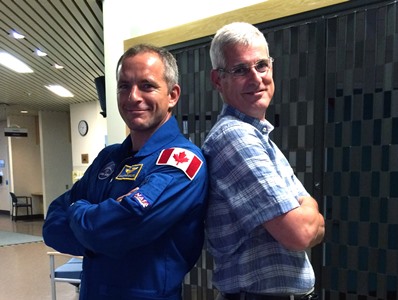 CSA astronaut Dr. David Saint-Jacques is one of 14 astronauts who agreed to take part in a world-first experiment to learn about bone marrow health in space. Photo credit: NASA-Aubrey Gemignani.Canadian Space Agency (CSA) astronaut Dr. David Saint-Jacques is taking part in a made-in-Ottawa experiment on bone marrow health during his six-month mission on the International Space Station.
CSA astronaut Dr. David Saint-Jacques is one of 14 astronauts who agreed to take part in a world-first experiment to learn about bone marrow health in space. Photo credit: NASA-Aubrey Gemignani.Canadian Space Agency (CSA) astronaut Dr. David Saint-Jacques is taking part in a made-in-Ottawa experiment on bone marrow health during his six-month mission on the International Space Station.
The study, led by Dr. Guy Trudel, is called MARROW, and will provide world-first insights into how space travel affects the bone marrow, which produces blood cells. These findings will inform longer space missions, and may also help patients back on Earth who spend weeks in bed recovering from illness.
“Aboard the International Space Station, I will be participating in hundreds of science experiments on behalf of researchers from around the world,” said Dr. Saint-Jacques. “I will conduct Canadian experiments which focus on health sciences, like MARROW. As a doctor, I have a strong interest for that type of research that has concrete impacts on the lives of Canadians.”
Dr. Saint-Jacques is one of 14 astronauts who signed up to be part of the MARROW study. Breath and blood samples are taken over the course of their six-month mission in space and in the year after they return to Earth. The goal is to understand how living in space affects their bone marrow health and how it recovers upon their return.
“What astr Dr. David Saint-Jacques had blood drawn aboard the International Space Station for a made-in-Ottawa study of bone marrow health. Photo credit: NASA.onauts go through in space is similar to what I see in my own patients,” said Dr. Trudel, a researcher and rehabilitation physician at The Ottawa Hospital Rehabilitation Centre and professor at the University of Ottawa. “The low gravity in space weakens muscles and bones. The same happens to patients who spend a long time in bed in the intensive care unit.”
Dr. David Saint-Jacques had blood drawn aboard the International Space Station for a made-in-Ottawa study of bone marrow health. Photo credit: NASA.onauts go through in space is similar to what I see in my own patients,” said Dr. Trudel, a researcher and rehabilitation physician at The Ottawa Hospital Rehabilitation Centre and professor at the University of Ottawa. “The low gravity in space weakens muscles and bones. The same happens to patients who spend a long time in bed in the intensive care unit.”
Many researchers travel to the Johnston Space Center to pitch their projects, hoping for astronauts to say “yes.” Dr. Trudel’s team beat the odds, with 14 astronauts signing up for MARROW in just three years.
“Very few astronauts we talked to said “no” to MARROW,” said Dr. Trudel. “Because they were so eager to sign up, everything is going much faster than I anticipated.” He expects all the data will be collected by 2020, and the results published soon after.
Not only did Dr. Saint-Jacques agree to take part in the study, but he also visited Dr. Trudel’s lab to help the team adapt their experiment for space.
“Dr. David Saint-Jacques has been a very enthusiastic supporter of MARROW,” said Dr. Trudel. “As a doctor, he could see this was an experiment that needed to be done, not only to help astronauts in space, but for patients here on Earth.” Dr. David Saint-Jacques (left) visited Dr. Guy Trudel’s lab to help the team adapt their bone marrow health experiment for space. Photo credit: University of Ottawa.
Dr. David Saint-Jacques (left) visited Dr. Guy Trudel’s lab to help the team adapt their bone marrow health experiment for space. Photo credit: University of Ottawa.
After recruiting all 14 astronauts, work is far from over for Dr. Trudel’s team. Every day they need to be aware of what is happening on the International Space Station so they can adapt the experiment or the delivery of supplies. Dr. Trudel said MARROW remains an exciting project, full of unknowns, including what the results will be. The project was funded by the Canadian Space Agency.
“Having a Canadian astronaut aboard the space station is the most visible part of Canada’s contributions to space exploration,” said Dr. Trudel. “But Canada’s work in robotics, artificial intelligence and telemedicine are all essential to the space program and helping the next generation of astronauts achieve even longer missions.”
For more information about Dr. Trudel’s MARROW project, see the Canadian Space Agency’s video, the University of Ottawa’s Tabaret, and NASA’s video and article. For more information about Dr. Saint-Jacques’ mission, see the Canadian Space Agency’s website.
Research at The Ottawa Hospital is made possible because of generous donations to The Ottawa Hospital Foundation.
The Ottawa Hospital: Inspired by research. Driven by compassion
The Ottawa Hospital is one of Canada’s largest learning and research hospitals with over 1,100 beds, approximately 12,000 staff and an annual budget of over $1.2 billion. Our focus on research and learning helps us develop new and innovative ways to treat patients and improve care. As a multi-campus hospital, affiliated with the University of Ottawa, we deliver specialized care to the Eastern Ontario region, but our techniques and research discoveries are adopted around the world. We engage the community at all levels to support our vision for better patient care. See www.ohri.ca for more information about research at The Ottawa Hospital.
University of Ottawa: —A crossroads of cultures and ideas
The University of Ottawa is home to over 50,000 students, faculty and staff, who live, work and study in both French and English. Our campus is a crossroads of cultures and ideas, where bold minds come together to inspire game-changing ideas. We are one of Canada’s top 10 research universities—our professors and researchers explore new approaches to today’s challenges. One of a handful of Canadian universities ranked among the top 200 in the world, we attract exceptional thinkers and welcome diverse perspectives from across the globe. www.uottawa.ca
Media Contact
Amelia Buchanan
Senior Communication Specialist
Ottawa Hospital Research Institute
Office: 613-798-5555 x 73687
Cell: 613-297-8315
ambuchanan@ohri.ca
